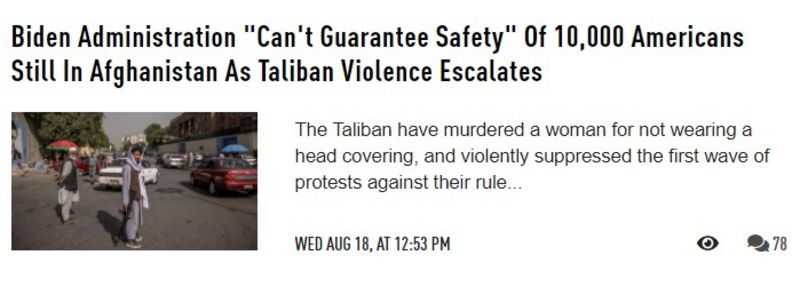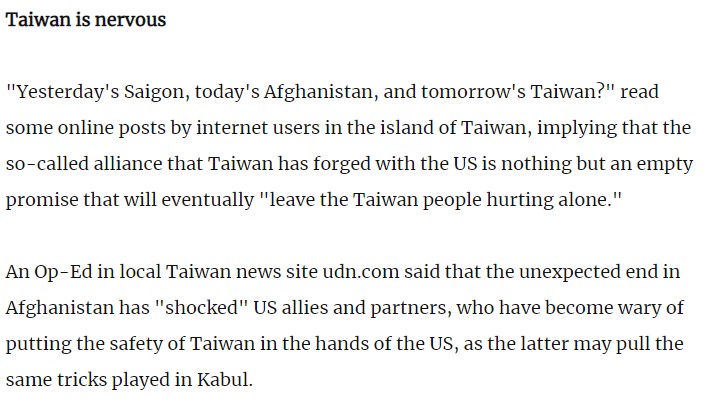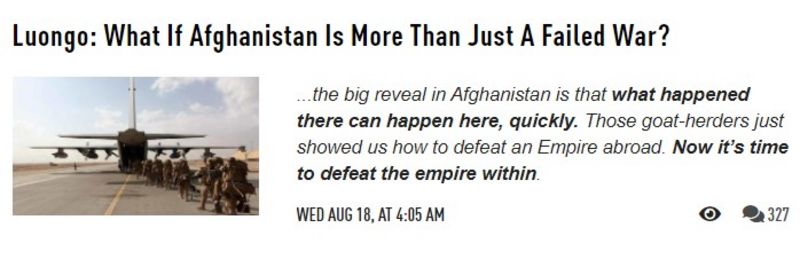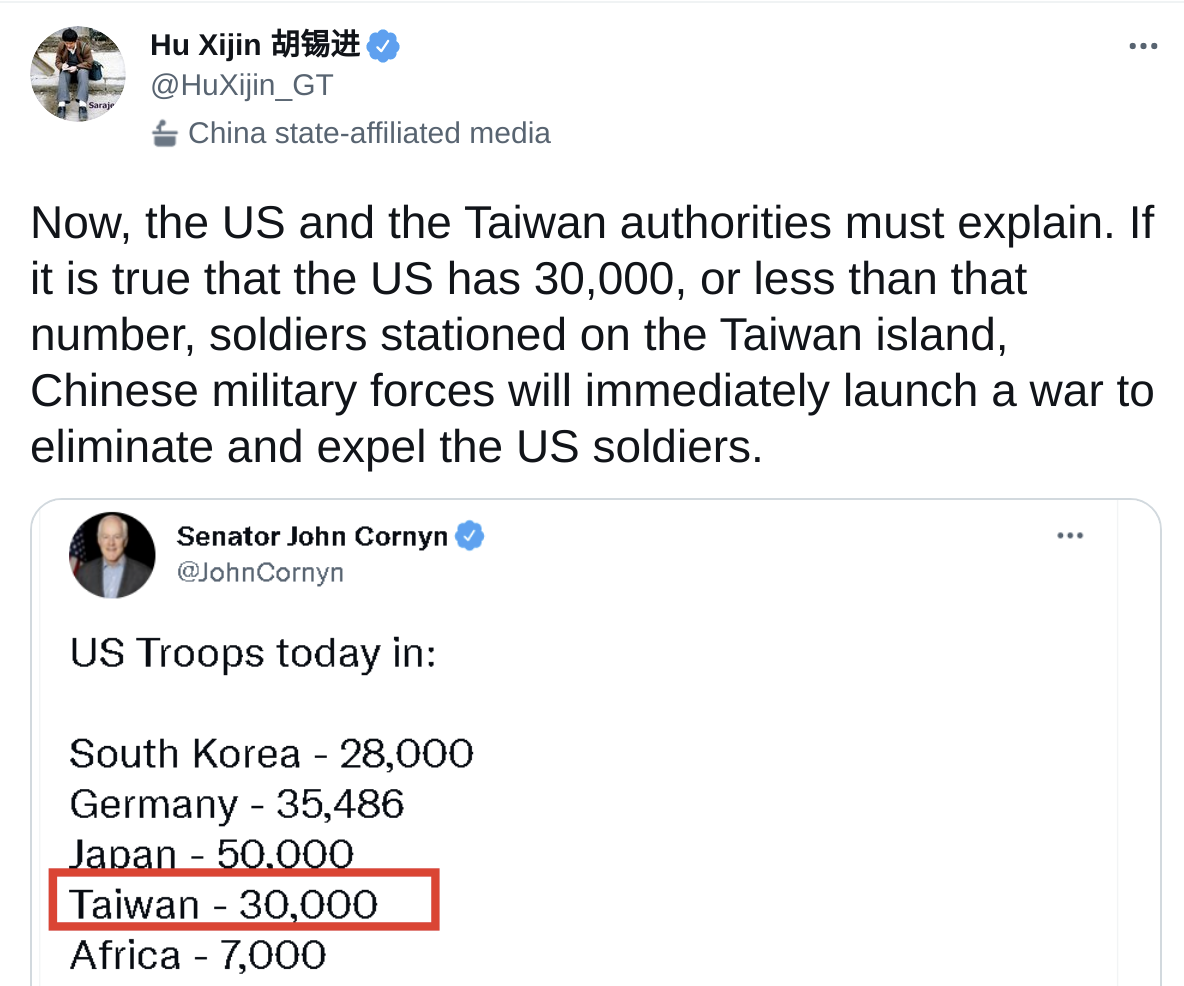China vs Taiwan and USA: Yesterday Saigon – Today Kabul – Tomorrow Taipei

While developments in Afghanistan are on everyone’s mind, an even different situation is currently emerging in the East and South China Seas, which could amount to a potential showdown between the People’s Republic of China and the island republic of Taiwan, as well as a showdown between Beijing and Washington. What developments are looming in this region right now?
If the chaotic pictures from the airport in Kabul alone did not speak for themselves, testifying to the catastrophic end of a twenty-year and senseless war of the West led by the United States in Afghanistan, it also becomes clear that the Biden administration seems to have “forgotten” about 10,000 American citizens behind the lines of the enemy.
It is really hard to believe that civilians were not flown out of Afghanistan at a much earlier stage before the military withdrew, and the same applies to the huge amount of American weapons that have now fallen into the hands of the Taliban. What are the daily news reports on these developments? Here is an overview:

Whether the Americans’ most modern weapons systems, including tanks and helicopters, should fall into the hands of the rapidly advancing Taliban intentionally or unintentionally is something I am personally unable to assess. Time will tell.
But the fact that ten thousand, other sources even speak of up to 14,000, American civilians were left behind in Afghanistan before the withdrawal of the military, I feel from a personal point of view as a serious disgrace that the Biden administration has brought upon itself.
Because these civilians, once they are captured, must expect to be held as political hostages by the Taliban – or even tortured with the goal of acquiring information. When has there ever been such a thing in American history, if one disregards the Iranian revolution and the associated U.S. embassy occupation?!
Be that as it may, from the point of view of China, which will push into the vacuum now opening up in Afghanistan (I would like to point out that according to estimates Afghanistan has mineral resources of up to three trillion US dollars (!)), the motto in Beijing seems to be not to let any crisis simply pass by unused.
It is the media mouthpiece of Beijing’s state leadership, the Global Times, which has warned the neighboring island republic of Taiwan, taking into account the current events in Afghanistan, as follows:
I would recommend to each reader to look through the report linked further above in the Global Times in its entirety and attentively!
In a report published yesterday by the Global Times it is said that the People’s Liberation Army of China (PLA) has carried out a large-scale fire maneuver at numerous localities around the island republic of Taiwan on yesterday’s Tuesday.
In this course it came to a common fire exercise of the Chinese navy and air force, in which beside numerous warships among other things also anti-submarine airplanes as well as fight jets would have participated.
These fire drills held by the PLA are said to be a direct response to the recent acts of cooperation and provocations by the United States and the political leadership of the island republic of Taiwan, which is referred to in the People’s Republic of China as a renegade province from the homeland.
The Global Times report quotes Chinese Colonel Shi Yi as saying that the exercise was a military exercise in the southeast and southwest of the island republic of Taiwan to test jointly conducted military operations by the Chinese Navy and Air Force.
According to Shi Yi, the United States and the island republic of Taiwan had recently sent joint signals that threatened not only the sovereignty of China but also peace in the Taiwan Strait. Moreover, the United States and Taiwan have advanced to become the biggest security risk from the perspective of the entire region, Shi Yi said.
The current developments in the Taiwan Strait correspond exactly to the statements and warnings made on Monday by Jack Posobiec, who had declared on Steve Bannon’s War Room program that China was wallowing in the face of the collapse in Afghanistan and America’s weakness, which was becoming evident worldwide, while “a frail puppet installed in Washington, D.C. has lost all sense of realism.”
In some American circles, therefore, there already seems to be concern that China could well use the current developments and the associated chaos in Afghanistan for itself in order to bring the island republic of Taiwan “home to the Middle Kingdom” in the course of a possibly imminent invasion.
Should such an event actually occur, i.e., a potential takeover of power by the Chinese Communist Party in Taiwan, it was warned, as it were, that the U.S. economy would face immediate collapse in such a case.
This is because the entire U.S. economy is built on the foundation of sufficient availability of semiconductors and computer chips, he said, especially from the perspective of advanced chip design and semiconductor production in the island republic of Taiwan.
If at some point the island republic of Taiwan were to come under the political and economic control of the People’s Republic of China, the U.S. economy would immediately find itself cut off from extremely important chip and semiconductor supplies, which would bring the domestic economy to its knees.
In a report in the Asia Times, political commentator Pepe Escobar also examines these developments and concludes that after the fall of Afghanistan, not only the Russian Federation but also China will now become the focus of Western foreign policy, insofar as it is still possible to speak of this at all in view of the current incidents.
In the following report on this subject, the question is raised whether the foreign policy collapse could prove to be only a harbinger of the collapse that Western nations may now be experiencing domestically as well?
We remember that the former Soviet Union’s military withdrawal from Afghanistan in 1989 had helped usher in the collapse of the then Soviet empire. This war, waged by the Soviets in the Hindu Kush over a period of ten years, was not successful either, but resulted in an ignominious military defeat.
How similar things are, since the Washington government – in contrast to the Soviets – cannot even manage to ensure an orderly withdrawal from Afghanistan. The only hope that remains is that current events will not prove to be a door-opener for further geopolitical upheavals – or even wars – in which there could be a showdown between the U.S. and its Western allies on the one hand and the Russian Federation and China on the other.
DepthTrade Outlook
It is advisable to consider a Twitter message from U.S. Senator John Cornyn yesterday, Tuesday, which read as follows:
With reference to this information, 30,000 U.S. troops are currently stationed in Taiwan. John Cornyn’s “revelations” have subsequently met with massive outrage and opposition in the People’s Republic of China after Hu Xijin, editor-in-chief of the Global Times, demanded a formal explanation from the Americans and Taiwan’s political leadership in response.
Hu stated as follows:
The Taiwanese opposition Kuomintang party then took to Twitter to point out that it must be a mistake on the part of U.S. Senator John Cornyn, since the last U.S. troops stationed in Taiwan were withdrawn on May 3, 1979.
Really? Please make up your own minds about the current developments in the South and East China Seas.









